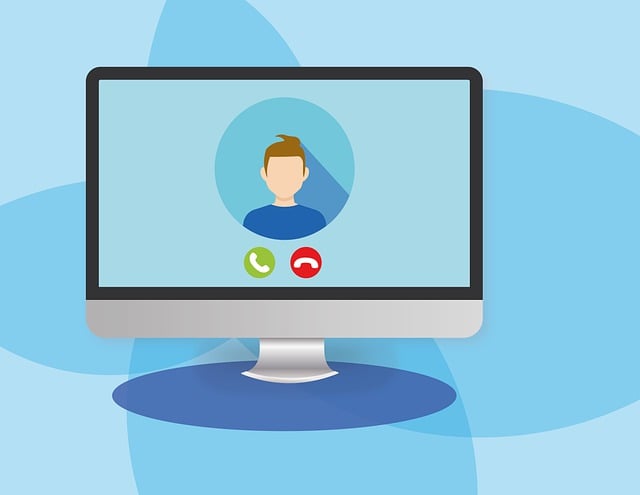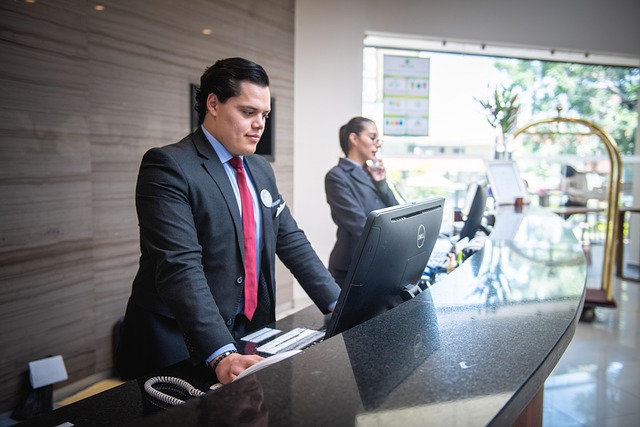Revolutionize Healthcare with Remote Medical Receptionists

Remote medical receptionist services streamline healthcare operations by managing calls, appointment…….
In the rapidly evolving digital landscape, healthcare is undergoing a significant transformation, and at the forefront of this revolution is the emergence of virtual medical receptionist services. This innovative concept has gained traction worldwide, offering enhanced patient care, improved operational efficiency, and cost-effectiveness for healthcare providers. This comprehensive article aims to provide an in-depth exploration of the virtual medical receptionist (VMR) phenomenon, its impact, and its role in shaping the future of healthcare administration. By delving into various aspects, from global adoption to technological advancements, we will uncover how VMRs are redefining patient interactions and streamlining medical practices.
A Virtual Medical Receptionist (VMR) is a digital solution that mimics the traditional role of a human receptionist in a medical setting but with advanced capabilities and accessibility. It operates as an automated, intelligent system, often powered by artificial intelligence (AI) and natural language processing (NLP), to handle various administrative tasks within healthcare facilities, clinics, or even telemedicine services.
The idea of virtual receptionists has its roots in the early days of computerization, but its application in healthcare gained momentum with advancements in AI and NLP technologies. Early implementations focused on simple task automation, such as scheduling and basic patient data management. However, the true potential of VMRs became evident with the onset of the COVID-19 pandemic, which accelerated the need for remote healthcare services and digital solutions.
The adoption of virtual medical receptionists has spread across continents, each region adapting the concept to suit its unique healthcare landscape.
The United States and Canada have been early adopters, with many medical practices integrating VMRs to improve patient experience and reduce operational costs. The American Telemedicine Association (ATA) reported a significant rise in telemedicine adoption during the pandemic, emphasizing the role of VMRs in enhancing remote healthcare access.
European countries like the UK, Germany, and France have embraced VMR technology, particularly in rural areas where healthcare access is a challenge. The European Commission’s Digital Health Strategy highlights the potential of AI-driven solutions, including VMRs, to improve cross-border healthcare services.
In regions like Australia and Japan, VMRs are being implemented to address workforce shortages and aging populations. These countries are investing in digital health infrastructure, making way for VMRs to play a pivotal role in providing timely patient care.
These regions are also witnessing increased adoption, with VMRs helping to bridge healthcare disparities and improve accessibility, especially in underserved areas. Governments and private healthcare providers are recognizing the cost-saving benefits and improved efficiency that VMRs offer.
The global virtual medical receptionist market is experiencing substantial growth, driven by factors such as rising healthcare costs, an aging population, and the need for remote patient monitoring.
According to a report by Grand View Research, the global VMR market size was valued at USD 350 million in 2021 and is projected to grow at a CAGR of 16.5% from 2022 to 2030. This growth is attributed to the increasing demand for cost-effective healthcare solutions and the need to enhance patient experiences.
Healthcare providers, technology companies, and venture capital firms are investing heavily in VMR technologies. Startups focused on AI-driven healthcare solutions have attracted significant funding, indicating investor confidence in the market’s potential. These investments are driving innovation, improving system capabilities, and expanding service offerings.
VMRs offer substantial ROI for healthcare providers by reducing operational costs associated with staffing and improving patient satisfaction. A study by Healthcare IT News found that VMRs can save practices up to 30% in administrative expenses, allowing them to allocate resources more efficiently. Additionally, improved patient retention and increased access to care contribute to better overall healthcare outcomes.
The continuous evolution of technology is propelling virtual medical receptionists into a new era of capabilities and possibilities.
AI remains the cornerstone of VMR technology, enabling systems to learn from data, adapt to patient needs, and make intelligent decisions. Machine learning algorithms can analyze vast amounts of healthcare data, improving diagnostic accuracy and personalized treatment recommendations. As AI continues to mature, VMRs will become more sophisticated in understanding complex medical queries and providing tailored responses.
NLP enables VMRs to interpret and generate human language, facilitating natural conversations with patients. Advances in NLP have led to more accurate speech recognition, better sentiment analysis, and improved language translation capabilities. These advancements enhance patient interactions, making VMRs more accessible and user-friendly.
VMRs are increasingly adopting voice-based interfaces, allowing patients to interact through voice commands. This hands-free approach is especially beneficial for individuals with limited mobility or visual impairments. Amazon Alexa and Google Assistant are examples of VUIs integrated into VMR systems, offering a more intuitive and accessible patient experience.
Cloud-based solutions provide the infrastructure for scalable and secure VMR services. This technology enables healthcare providers to access VMR systems remotely, ensuring accessibility from any location. Cloud computing also facilitates data storage, backup, and recovery, enhancing system reliability.
Seamless integration of VMRs with EHR systems allows for efficient data sharing and improved patient continuity of care. This integration ensures that the latest patient information is readily available, enabling healthcare professionals to make informed decisions.
The rapid development of virtual medical receptionist services has prompted regulatory bodies worldwide to establish guidelines and policies to ensure patient safety, data privacy, and ethical practices.
With VMRs handling sensitive patient information, data privacy and security are paramount. Regulations such as the General Data Protection Regulation (GDPR) in Europe, the Health Insurance Portability and Accountability Act (HIPAA) in the US, and similar acts worldwide dictate how healthcare data can be collected, stored, and shared. Compliance with these regulations is essential for VMR providers to maintain patient trust and avoid legal repercussions.
Many countries have implemented policies supporting telehealth and remote patient monitoring, recognizing their potential to improve healthcare access. These policies often include guidelines for VMRs operating in telemedicine settings, ensuring patient consent, data security, and informed communication.
Some jurisdictions require specific licensing or certification for VMR systems to ensure they meet certain quality and safety standards. These measures protect patients by guaranteeing that VMRs function within defined parameters and adhere to ethical guidelines.
Despite their numerous advantages, virtual medical receptionists face several challenges and criticisms that must be addressed for widespread acceptance.
One of the primary concerns is the technical sophistication required for VMRs to function effectively. Issues like poor internet connectivity in rural areas or limited device accessibility can hinder implementation. Overcoming these challenges involves infrastructure development, providing affordable technology solutions, and ensuring digital literacy among healthcare professionals and patients.
As mentioned earlier, data privacy and security are critical issues. VMRs must adhere to strict protocols to protect patient information from unauthorized access or breaches. Regular system audits, encryption technologies, and employee training can help mitigate these risks.
Gaining patient trust is essential for the successful adoption of VMRs. Some individuals may be hesitant to share personal health information with automated systems or prefer human interaction. Building trust involves transparent communication about data usage, providing clear privacy policies, and ensuring accurate and reliable service delivery.
VMRs must adhere to ethical guidelines, particularly in areas like patient consent, data sharing, and decision-making autonomy. Ensuring that VMRs respect patient rights and provide informed choices is crucial for maintaining ethical standards in healthcare.
To address the identified challenges, several strategies can be employed:
In a remote Australian town, a primary healthcare clinic implemented a VMR system to improve access for underserved communities. The VMR handled initial patient triage, scheduling, and basic health advice, offloading administrative tasks from overburdened staff. This freed up clinical time, allowing healthcare professionals to focus on complex patient needs. Patient satisfaction surveys revealed increased convenience and improved communication with the clinic.
A network of specialized clinics in the US adopted VMR technology to support their telemedicine services during the COVID-19 pandemic. The VMRs streamlined patient onboarding, ensuring that remote consultations were efficient and secure. By managing appointments, collecting patient history, and providing pre-consultation assessments, VMRs enhanced the overall telemedicine experience. This case highlights the role of VMRs in expanding healthcare access during crises.
A multicultural urban clinic in Toronto integrated a multilingual VMR to address language barriers. The system offered patient check-in and basic health advice in multiple languages, improving communication and reducing wait times. This initiative enhanced patient engagement and satisfaction, especially among new immigrants and refugees with limited English proficiency.
The virtual medical receptionist landscape is poised for significant growth and innovation, with several emerging trends shaping its future.
VMRs will play a pivotal role in delivering personalized healthcare experiences by leveraging patient data and AI analytics. These systems can offer tailored health recommendations, provide proactive care suggestions, and adapt to individual patient needs, fostering a more engaging and efficient healthcare journey.
The integration of VMRs with telehealth platforms will create seamless remote healthcare experiences. VMRs can facilitate virtual appointments, manage pre-consultation assessments, and ensure patient readiness, enhancing the overall quality of remote patient monitoring.
Advanced AI algorithms will enable VMRs to provide clinical decision support to healthcare professionals. By analyzing patient data and medical literature, VMRs can offer evidence-based recommendations, aiding in diagnosis and treatment planning. This collaboration between humans and machines will improve clinical outcomes and reduce errors.
As voice user interfaces continue to evolve, VMRs will transform into personal health assistants, accessible through smart speakers or mobile devices. Patients can ask questions, book appointments, and receive personalized health guidance using natural language conversations.
VMRs have the potential to facilitate global health data exchange, enabling secure sharing of anonymized patient information for research and improving healthcare outcomes worldwide. This collaborative approach could lead to breakthroughs in disease prevention and treatment.
The concept of virtual medical receptionists has evolved from a niche idea to a transformative force in healthcare administration. As technology advances and global health challenges emerge, VMRs will play an increasingly critical role in improving patient access, streamlining administrative tasks, and enhancing overall healthcare experiences.
By embracing these innovations, healthcare providers can achieve cost savings, improve operational efficiency, and focus on delivering high-quality patient care. The success of VMRs lies in their ability to adapt to diverse healthcare settings, address specific needs, and continuously evolve with technological advancements. As we navigate the future of healthcare, virtual medical receptionists will undoubtedly leave an indelible mark on shaping more accessible, efficient, and responsive healthcare systems worldwide.
Q: How do VMRs ensure patient privacy and data security?
A: VMRs adhere to strict data protection regulations and implement robust security measures like encryption, access controls, and regular system audits to safeguard patient information.
Q: Can VMRs replace human receptionists in healthcare settings?
A: While VMRs automate many tasks, they are not meant to replace human interaction entirely. They handle routine administrative duties, allowing trained healthcare professionals to focus on complex patient care.
Q: How do VMRs adapt to different cultural and linguistic contexts?
A: Multilingual VMR systems can be tailored to support various languages and dialects, ensuring effective communication with diverse patient populations. This adaptability is crucial for multicultural communities.
Q: What are the potential challenges in implementing VMR technology in low-resource settings?
A: Low-resource settings may face challenges such as limited internet connectivity, outdated hardware, and a lack of digital literacy. Addressing these issues requires targeted investments in infrastructure and training to ensure successful VMR implementation.
Q: How do VMRs contribute to improving healthcare accessibility?
A: VMRs enhance healthcare accessibility by providing remote consultations, streamlining appointment scheduling, and offering basic health advice to patients in remote or underserved areas. They also reduce wait times and improve response rates for patient inquiries.

Remote medical receptionist services streamline healthcare operations by managing calls, appointment…….

Telehealth receptionist services revolutionize healthcare access and patient experiences by managing…….

Virtual front desk healthcare solutions revolutionize patient experiences by offering 24/7 online re…….

Healthcare organizations adopt remote receptionist services to streamline operations and improve pat…….

Remote receptionist services transform healthcare call management by offering 24/7 support, efficien…….

Remote medical receptionist services streamline healthcare operations by managing calls, scheduling,…….

Healthcare practices in the digital age are optimizing with virtual front desk services, improving p…….

Virtual front desk healthcare solutions streamline patient engagement and operational efficiency in…….

Remote medical receptionist services streamline healthcare operations by handling calls, scheduling…….